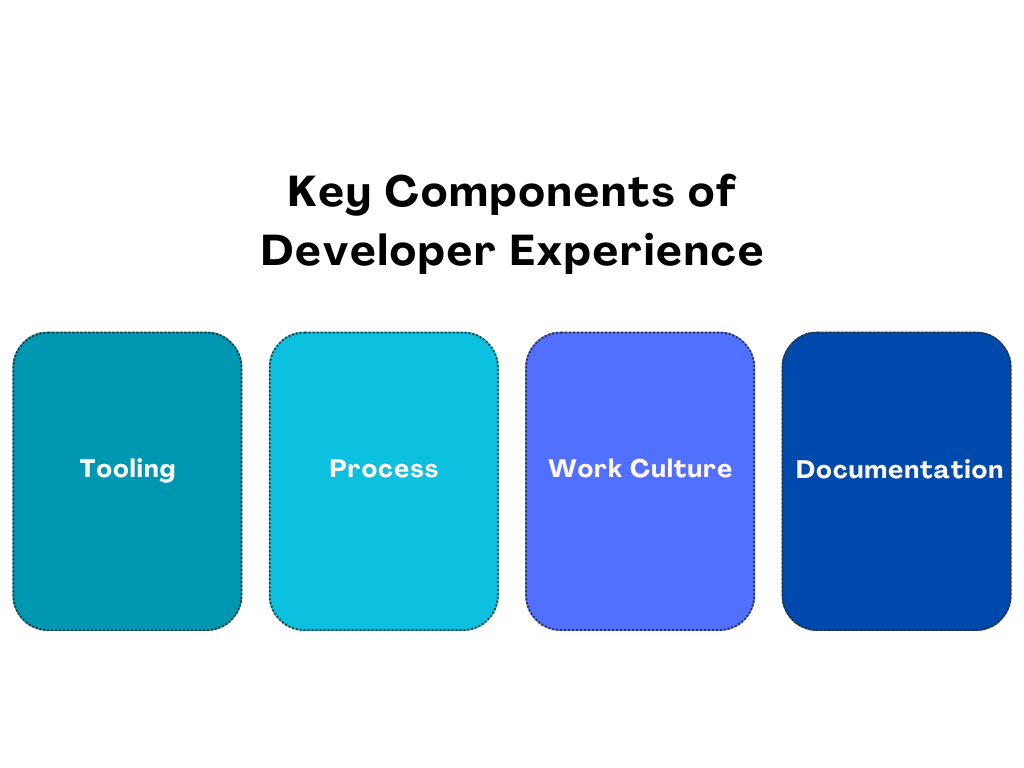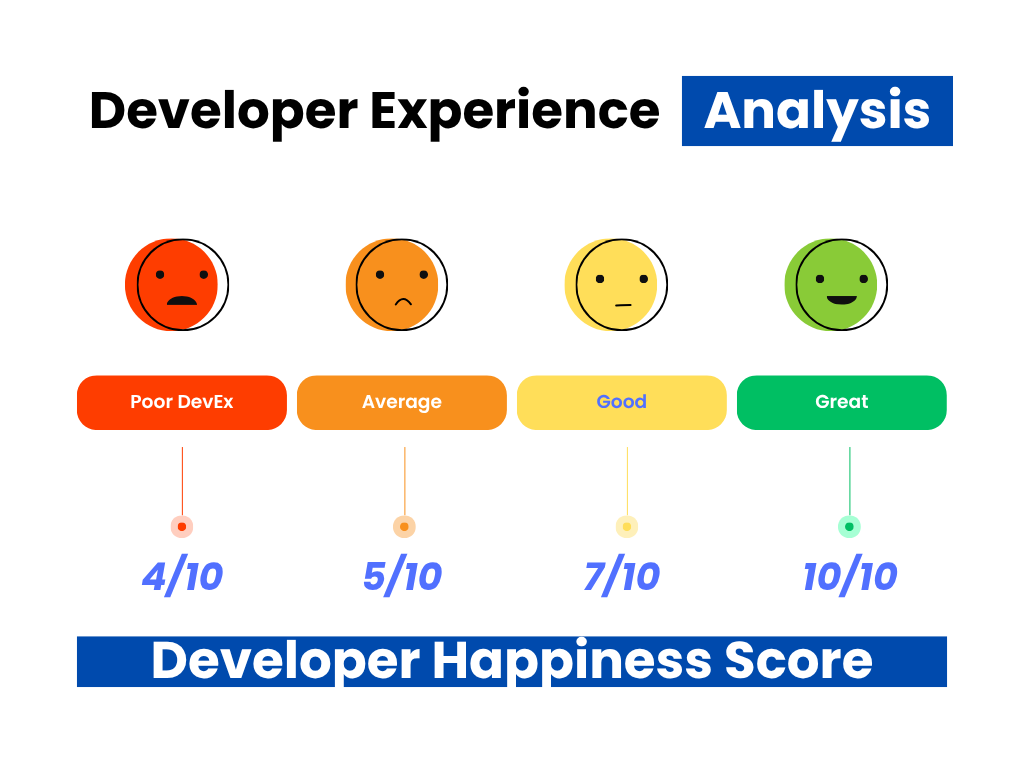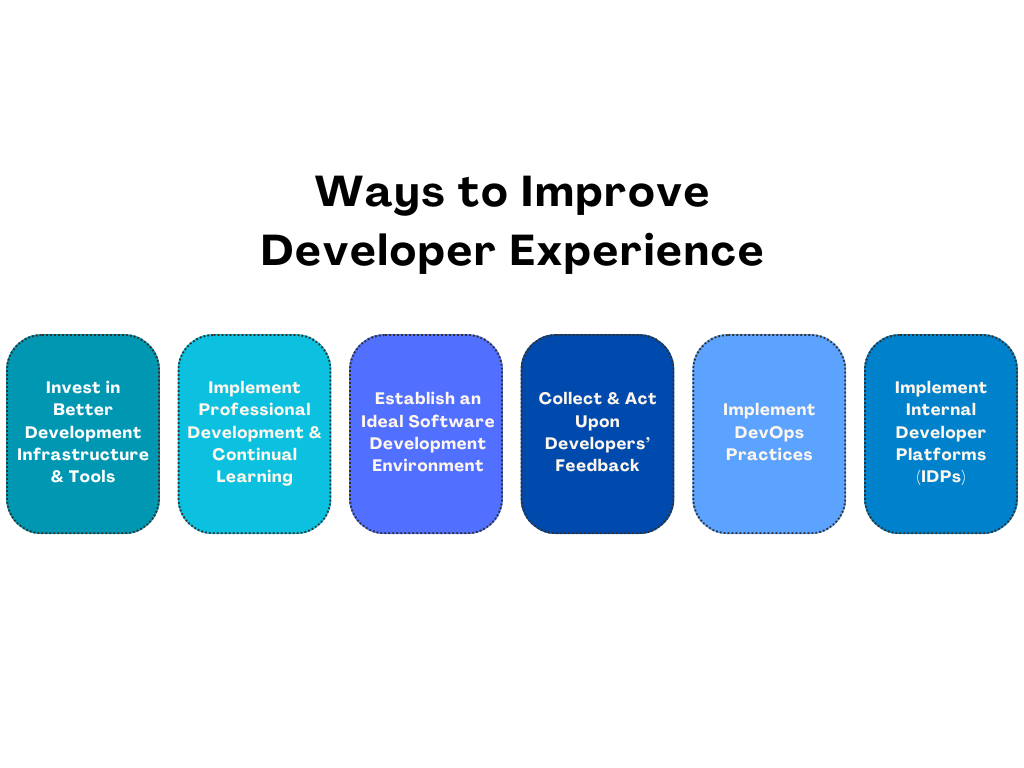And that’s where Developer Experience (DevEx) comes to the scene! Today, one of the most critical aspects of evaluating developers’ experience while they are working on a project involves the processes they adopt or the tools they use. With a positive DevEx, you can expect to attain enhanced code quality, improved productivity, and better job satisfaction.
There are diverse metrics that go into deciding if Developer Experience is on the positive or negative side. In this article, you will get a clear insight into what DevEx is and how to assess & improve it.
What is Developer Experience (DevEx)?
Keeping aside the work output, DevEx is meant to determine the’ quality of interaction of developers with their workflows, environment, tools, and work culture. The purpose of it is to create an efficient, enjoyable, and seamless environment for developers to build quality products.
In simple words, DevEx refers to how convenient or complex it is for your developers to conduct essential tasks. There are certain factors beyond any developer’s control that can impact the quality of output, and Developer Experience addresses them all. The ultimate goal of DevEx is to enhance the productivity and satisfaction quotient of developers, which will directly impact the success of business projects. Following are the key components of the DevEx:

-
Tooling:
Developers would like to have the flexibility of jumping to new code bases or entirely new projects without much hassle. For that, they seek access to an efficient development kit, ideal for helping them add value to every task they do. Whether it is about coding, collaborating with teams, or testing the software, efficient tooling and development processes indicate a positive DevEx.
-
Process:
There should be a proper plan or process of approach specified for developers to take on any of the projects. Beyond that, the project management team should define reasonable deadlines, allocate required resources, be responsive to developers’ requests, and provide continued support. These are a few traits of quality project management that ease the developers’ work and boost their overall satisfaction quotient.
Beyond that, every developer working within your organization would like to know if their work is meeting the expected outcomes. Therefore, an efficient code review process with shorter feedback cycles or loops contributes towards improving the overall Developer Experience. Developers who receive timely feedback on their performance are more likely to be immensely invested and motivated towards producing high-quality outputs.
-
Culture
The software development teams might often have to work in collaboration with other departments, especially for operations or security. For instance, developers might have to team up with the marketing team, sales teams, product managers, and other stakeholders. Seamless communication within teams, supportive management, and cross-functional collaboration using diverse tools can guarantee a great work culture, leading to positive DevEx.
-
Documentation
Developers must have easy access to relevant documentation important for specific projects. These are necessary resources for developers to understand the frameworks, libraries, and APIs. Organizations must ensure the documentations are updated with relevant examples and brief tutorials that can cater to the varying learning styles of developers. Such accessibility to critical documentation can contribute to positive Developer Experience.
Why is Developer Experience Important?
Developer Experience holds utmost importance for any organization, as it prioritizes the needs and contributions of all your developers. You get to scale the quality of your organizational output by striving to achieve a positive DevEx for your team. Some of the ways DevEx showcases its importance include:
1. Better Productivity:
Working under tight deadlines, dealing with bug-ridden code, or facing long feedback times are some of the common issues or inefficiencies that might be affecting the productivity of developers.
Now, not all of these issues can be fixed by upgrading certain tools! Therefore, working on improving DevEx through shorter feedback times, manageable workloads, realistic deadlines, and more would drive more productivity for developers.
2. Improved Job Satisfaction:
Developers who are satisfied with their jobs in your organization will be less prone to burnout or delivering poor performance. Achieving good DevEx will lead to reduced frustrations and improved motivation.
This way, your developers will find a way out of even the most challenging parts of their work roles, driving quality output with confidence. Not just that, but better job satisfaction also provides developers with a purpose and sense of autonomy in their work.
3. Reduced Operational Expenses:
Beyond developers’ satisfaction, positive DevEx also helps you reduce overall operational costs. It is because when you use streamlined workflows and efficient development tools, you will save a lot of developers’ productive time.
By reducing the unwanted time spent on non-productive tasks such as handling system downtimes or finding bugs, you will save a lot of money. As a result, projects will be delivered faster and with fewer resources.
How to Measure Developer Experience?
In order to measure the effectiveness of DevEx, you ought to track 5 key metrics. These metrics will provide you with insight into how satisfied your developers are, the overall efficiency of the development processes, and the talent retention quotient. To help you better understand the ideal process of measuring Developer Experience, here are the metrics you must prioritize in your audits:
1. Satisfaction Quotient and Happiness Score of Developers

To determine if DevEx in your organization is positive, you must measure the satisfaction and happiness scores of your developers. Conducting developer surveys and determining these scores will reflect how confident your team is with the development tools, work environment, processes, and organizational relationships.
2. MTTR (Mean Time to Recovery)
There will be times when your software projects will incur interruptions, such as total or partial failure. The MTTR metric will determine how much time it takes for your developers to recover from those situations. This metric will help you track the efficiency of your team in handling critical incidents, irrespective of the root cause.
3. Deployment and Development Cycle Time
This metric will evaluate the overall speed and efficiency of development & deployment processes within your organization. For instance, a high-performance organization with robust developers will be around 100x faster with their development cycle and deployment, when compared to less-efficient teams.
4. Number of Software Deployments
In order to correctly assess the DevEx, you need to determine the total number of deployments recorded per day or week. You ought to calculate the weekly average of software deployments every month. Following that, do a month-on-month comparison to see if the number of deployment stays constant or improves, which will indicate the DevEx.
5. Attrition & Retention Rates
This metric assesses the ability of your organization to retain talent and the rate at which employees voluntarily resign from their roles. Irrespective of the reasons, such as extreme burnout, excessive workload, or others, the attrition rates must be brought under control, while the retention rates must be higher, ensuring positive DevEx.
6. Code Quality
Assess the quality of code produced by your team of developers, which will be the ultimate test to indicate their work experience. Better code quality ensures higher success rates, which implies that the development environment aligns with the professional experience of your team, guaranteeing positive Developer Experience.
How to Improve Developer Experience?

You must know that improving Developer Experience is not a one-time job! Instead, it is an ongoing process that requires diverse strategies and periodic audits. Here are some of the tips that you must follow if you want to improve Developer Experience for your organization:
1. Invest in Better Software Development Infrastructure and Tools
Bring in efficient, reliable, and user-friendly software development tools, and accommodate them to a high-performance infrastructure. It is a crucial measure you must take to improve DevEx.
Some of the things that you can bring in include:
- Version control systems
- Automated testing tools
- Deployment platforms
- AI coding assistants, etc.
Providing your developers with modern-day tools can boost their overall satisfaction quotient, driving better productivity.
2. Implement Professional Development & Continual Learning
You ought to make sure that your developers stay updated with the newest technologies and development methodologies. Such an effort will encourage a work culture for your organization that prioritizes perpetual enhancement and innovation.
Adopting new development strategies and learning about current industry trends will play a pivotal role in improving DevEx.
3. Establish an Ideal Software Development Environment
You must prioritize creating an appreciable environment for developers to code and collaborate with other departments within your organization. It will showcase that you are investing in improving the experience of individual developers.
For this, you can consider:
- Reducing the overall workload of your developers to the maximum possible extent.
- Schedule fewer meetings.
- Shorten the review times.
- Prevent frequent context switching and workflow interruptions.
Take note of these factors, and you will eventually be providing your developers a strong environment to focus, innovate, and deliver high-quality software products.
4. Collect & Act Upon Developers’ Feedback
In order to improve Developer Experience, you must regularly collect developers’ feedback within your organization and act upon it. With feedback, you gather insights into what your team likes or dislikes, giving you a better understanding of what to improve. Make targeted enhancements that you think will directly impact DevEx.
5. Implement DevOps Practices
Adopting modern-day DevOps practices can help you streamline development workflows and establish CI/CD (Continuous Integration/Continuous Delivery) pipelines. Following that, introducing automation will help you reduce manual intervention for handling repetitive tasks, minimizing human errors, and accelerating SDLC.
6. Implement IDPs (Internal Developer Platforms)
IDPs or Internal Development Platforms are a set of tools that you can integrate into your company for streamlining the overall development process. These tools will provide your developers with adequate resources for managing work environments, deploying code, and leveraging Kubernetes, all under one roof.
Leverage Positive Developer Experience to Improve Quality Software Deployments!
You need to take into account DevEx as the key to unleashing the power of your developers in building quality software products. When your developers have the right motivation, tools, technologies, resources, and team, they can guarantee success for the projects they handle.
In the end, you must know that improving Developer Experience isn’t just about making lives easier for your software engineers, but also about driving innovation, productivity, and quality for your business.
Prioritizing DevEx will also help you attract top talent, lead the market, and accelerate product development. So, whether you want to streamline your business workflows, upgrade development tools, or build an autonomy culture, Developer Experience is paramount!



